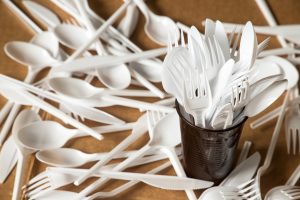
Feds banning plastic bags, straws, cutlery, and other single-use items by the end of 2021
Canadian Plastics
Canadian Plastics PackagingThe proposed ban was first promised by the Liberal government back in 2019, and will cover many of the most common non-reusable plastic products.

Photo Credit: marcinm111/Adobe Stock
The federal government has unveiled the list of soon-to-be-banned single-use plastic items, which includes plastic grocery bags, straws, stir sticks, six-pack rings, cutlery, and food containers made from hard-to-recycle plastics.
The items will be out of use nationwide by the end of 2021, Environment and Climate Change Minister Jonathan Wilkinson announced on Oct. 7.
The proposed ban covers many of the most common non-reusable plastic products, while other items will be exempted. Single use items covered by the proposed ban include checkout bags, stir sticks, beverage six-pack rings, cutlery, straws, and food packaging made from plastics that are difficult to recycle. Single-use plastic products not covered by the ban include garbage bags, milk bags, snack food wrappers, disposable personal care items and their packaging, beverage containers and lids, contact lenses and packaging, cigarette filters, items used in medical facilities, and personal protective equipment.
The Liberal government first promised to ban single-use plastics items last year, but steps in that direction were delayed by the COIVD-19 pandemic. The government recommitted to the idea in its recent throne speech, but said the ban will not impact access to PPE or other plastics used in medical facilities.
The bans are part of the federal government’s plan to achieve zero plastic waste by 2030.
The proposal is open to public feedback at this link until Dec. 9. The finalized new regulations wouldn’t come into effect until the end of 2021.
The Oct. 7 announcement includes a proposal to establish recycled content requirements in products and packaging, which the federal government says will spark investment in recycling infrastructure and innovation in technology to extend the life of plastic materials to keep them in the economy, and out of the environment for longer.
The federal government also has a target of at least 50 per cent recycled content in plastic products by 2030, and under the new regulations the government will require a minimum percentage of recycled content, rules for measuring and evaluating the amount of recycled content, and guidelines and related tools to help companies meet their requirements.
But the Ottawa-based Chemical Industry Association of Canada – which recently merged with the Canadian Plastics Industry Association – has come out against the bans and urged the government to give time for plans being developed to modernize recycling systems across the country, including with national waste legislation. “CIAC supports the development of national waste legislation that will provide the appropriate authorities and the tools to support advancing a circular economy for plastics,” the association said in an Oct. 7 statement. “Our goal, as a society, must be to properly manage and establish a circular economy for all plastic products.”
In particular, CIAC urged the federal government to delay a plan to list plastic products on schedule 1 of the Canadian Environmental Protection Act, which could declare them toxic. Elena Matagaris, vice president of the plastics division of the CIAC, said in a report that “plastic products don’t belong anywhere near a list of harmful products that includes mercury, asbestos, and lead. It’s a criminal-law tool and it’s intended to manage toxic substances. Plastic is an inert material — it’s not toxic.” Matagaris said that branding plastics as “toxic” will cause “reputational damage to [the] sector”. “That’s not fair game,” she added.
The government’s announcement also drew a response from industry association Restaurants Canada, a not-for-profit association representing Canada’s food service industry. In a statement, the group says it will keep pushing for policies that “avoid any undue burden on businesses continuing to rely on single-use items to safeguard the health and safety of staff and customers.”
“The COVID-19 crisis has made the critical need for single-use items very clear,” spokesperson Marlee Wasser in a statement. “Throughout the pandemic, restaurants have quickly and effectively adapted to evolving public health guidance. Businesses are willing to adapt their practices and make investments to support progress toward the implementation of a Canada-wide Strategy on Zero Plastic Waste. But they want to ensure these investments are effective.”
